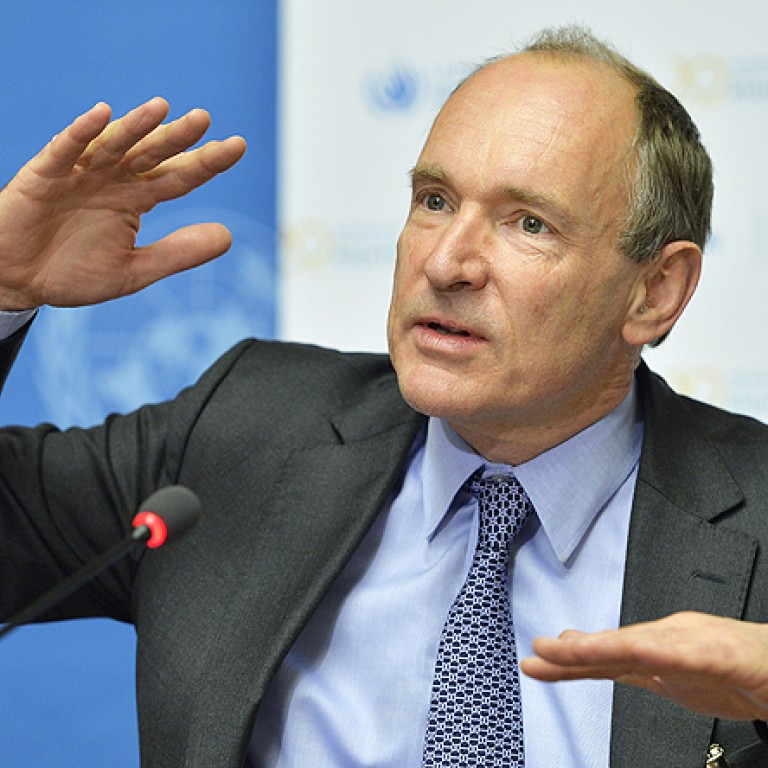
Activists, civil society groups call for overhaul of governments’ privacy laws
Tim Berners-Lee, the inventor of the World Wide Web, has teamed up with more than 100 civil society groups and leading activists to call on governments to overhaul their privacy laws, stop secret mass surveillance online and the persecution of whistle-blowers.
Those concerns were raised by the group in a letter addressed to the Open Government Partnership (OGP), an international platform set up in 2011 for domestic reformers committed to making their governments more open, accountable, and responsive to citizens.
That initiative followed the unanimous adoption by the United Nations General Assembly on Wednesday of a resolution on cyberspace privacy. The resolution, “Right to privacy in the digital age”, established for the first time that “human rights should prevail” and must be protected online or offline, according to a UN statement.
A truly open government does not spy on the public – that is for authoritarian regimes
Last week, a coalition of the world’s leading information technology companies – including Apple, Google, Facebook, Microsoft and Yahoo – called on the United States government to take the lead in reforming government laws and practices.
“Laws to limit the state’s power to spy on its citizens are fundamental to democracy’s checks and balances. But these laws are outdated,” said Anne Jellema, the chief executive at the World Wide Web Foundation, one of the main signatories to the letter sent to the OGP.
“With digital technologies making it trivially easy to collect and store billions of pieces of data on entire populations, and with public interest whistleblowers receiving little protection, the whole system of checks and balances on state power is being pushed dangerously close to breaking point,” Jellema said.
The letter to the OGP expressed concern “over allegations that governments around the world, including many OGP members, have been routinely intercepting and retaining the private communications of entire populations in secret, without particularised warrants and with little or no meaningful oversight”.
It pointed out that those practices have “a deeply chilling effect on freedom of expression, information and association”.
Revelations made public in June by whistle-blower Edward Snowden, the fugitive former US intelligence contractor, about internet surveillance carried out by the US government’s intelligence units, led by the National Security Agency (NSA), have sparked a broader discussion globally of online privacy issues.
According to Snowden, the NSA had been hacking computers in Hong Kong and the mainland since 2009. The targets included the Hong Kong Internet Exchange at the Chinese University, public officials, students and various businesses in the city.
Senior government officials and lawmakers in the US have rejected suggestions of granting clemency for Snowden, who was granted asylum in Moscow in August, after he leaked classified materials about NSA activities to the news media.
The letter to the OGP also cited the “International Principles on the Application of Human Rights to Communications Surveillance”. It pointed out that activities that restrict privacy can only be justified when they are prescribed by law, are necessary to achieve a legitimate aim, and are proportionate to the aim pursued.
It said: “Without firm legislative and judicial checks on the surveillance powers of the executive branch, and robust protections for the media and public-interest whistle-blowers... abuses can and will occur.”
The action plan proposed for the OGP included: updating privacy laws to reflect modern surveillance technologies and techniques; complete a review of national laws by October next year; and a commitment from OGP members to be transparent on mechanisms, exports and aid involving surveillance technologies, as well agreements to share citizen data among states.
Helen Darbishire, the executive director at Access Info Europe, said: “A truly open government does not spy on the public – that is for authoritarian regimes. We urgently need reinforced protection for the right to privacy and we need sufficient transparency about surveillance to be able to protect against illegal activity.”
The other signatories to the letter to the OGP, included: Privacy International, the Global Network Initiative, Oxfam International, the Centre for Law and Democracy, Indian political and social activist Aruna Roy, former journalist and Global Voices Online founder Rebecca MacKinnon, and Hong Kong In-Media.
In a statement, Brad Smith, Microsoft’s general counsel and its executive vice-president for legal and corporate affairs, said: “People won’t use technology they don’t trust. Governments have put this trust at risk, and governments need to help restore it.”
Many large domestic and multinational companies in Hong Kong have stepped up efforts to buttress their cybersecurity resources after the revelations of Snowden about wide-scale internet spying by US intelligence agencies.
Pacnet, the operator of Asia’s largest privately owned submarine cable network, has initiated a sweeping security audit, following Snowden’s disclosure that computers at its Hong Kong headquarters were hacked by the NSA in 2009.

